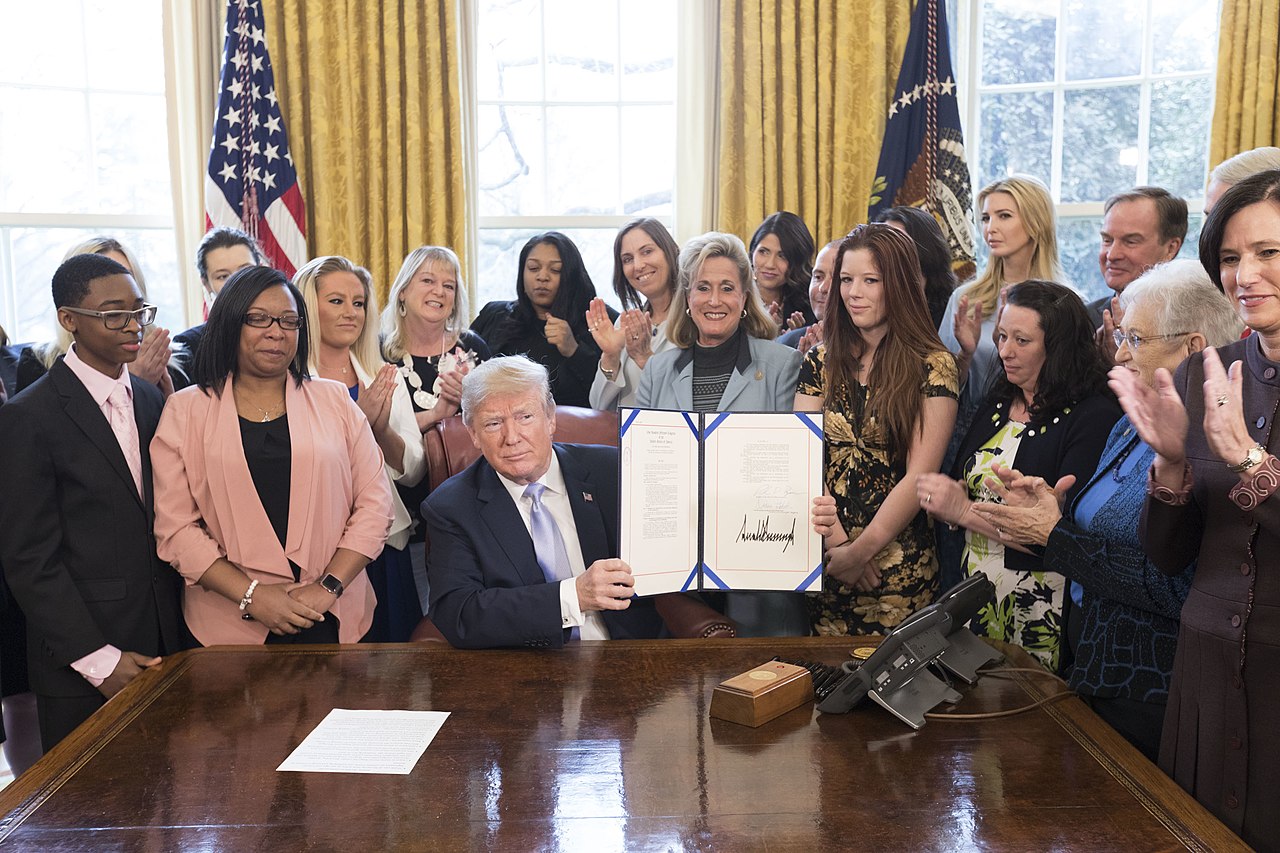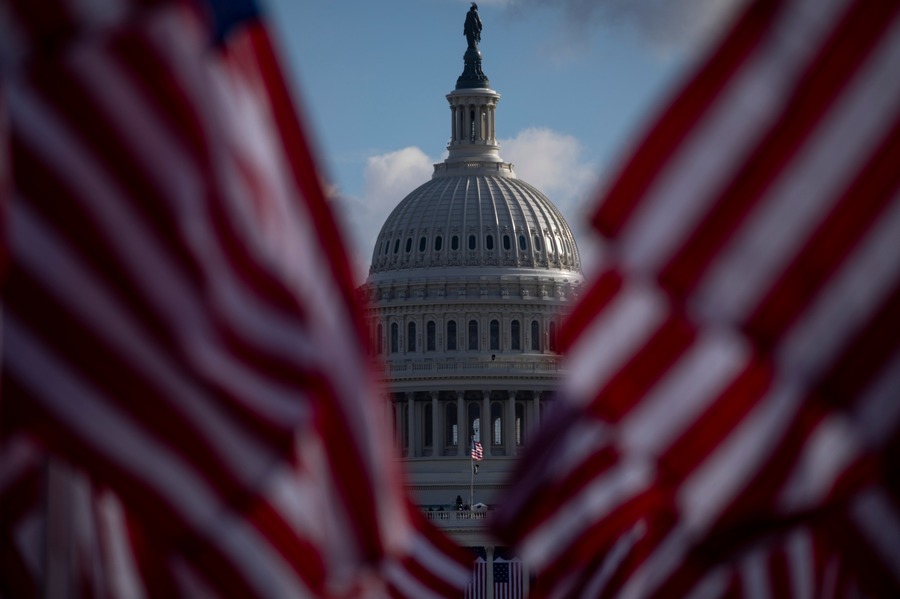What Happened the Last Time Congress Amended § 230
FOSTA, which became law in 2018, deserves greater attention as a cautionary tale about what can go wrong with reforms of § 230.

Published by The Lawfare Institute
in Cooperation With

Editor’s note: This piece is a modified excerpt from the author’s Brookings Institution paper, “The Politics of Section 230 Reform: Learning From FOSTA’s Mistakes.”
For most of its 26-year existence, Section 230 of the Communications Decency Act—the statute that generally shields websites from legal liability for third-party content—was familiar mostly just to lawyers and technologists. Now, though, it seems to many American politicians’ favorite scapegoat when it comes to technology policy. The statute has spent enough time in the headlines that journalists and commentators have developed a habit of referring to it as “once-obscure.”
Section 230 has become a focus of ire on both the left and the right as part of the ongoing debate over whether and how to regulate the internet. In the 116th Congress, lawmakers formally introduced more than 25 bills to amend or repeal the statute. The 117th Congress has already seen almost 30 such proposals. Arguments over technology policy and internet regulation pull in a number of different directions, but almost everyone seems to agree that something should be done about § 230—even if nobody can agree what that something is.
Yet, amid all of this debate, there has been practically no discussion on Capitol Hill of the last time that Congress revised § 230—just three years ago. In 2018, President Trump signed into law the Allow States and Victims to Fight Online Sex Trafficking Act (FOSTA). Among other provisions, FOSTA carved an exception out of § 230’s liability shield for websites that “knowingly assist[], support[], or facilitate[]” activity violating federal sex trafficking law, opening internet companies up to a potential wave of lawsuits over material for which they’d previously received legal protection. The bill passed with overwhelming support in both chambers of Congress.
FOSTA would seem to be an obvious touchstone for discussions around § 230 reform today. It’s not only a recent precedent but also one that enjoyed bipartisan support by a wide margin—no small feat in a polarized time. Three years after its passage, however, the law does not make for an encouraging model. Studies suggest that the law likely placed sex workers at increased risk, as people lost access to websites used to advertise and communicate about the sex trade and were forced to work on the street in dangerous conditions. And apart from FOSTA’s changes to § 230, a July 2021 report by the Government Accountability Office (GAO) showed that federal prosecutors have had little use for the additional criminal penalties for sex trafficking established by FOSTA. The law may even have hindered efforts to investigate and prosecute trafficking.
But Congress seems to have little interest in reviewing its past work. The GAO report arrived to little fanfare from Capitol Hill. And FOSTA remains almost entirely absent from current political discussions around amending § 230.
That’s unfortunate because, when it comes to § 230 reform, FOSTA deserves greater attention as a cautionary tale. The law is “a case study as to how platforms react to new § 230 exemptions,” writes Jeff Kosseff, an associate professor at the U.S. Naval Academy and the author of “The Twenty-Six Words That Created the Internet,” a book about § 230. In response to FOSTA’s broad and confusing exceptions to liability protection under § 230, a wide range of companies shut down or limited access to online services, including services that had little or nothing to do with sex trafficking. As the first major revision to § 230 since the statute became law more than two decades ago, FOSTA’s ripple effects demonstrate why lawmakers should move with extreme care in attempting to revise § 230.
Section 230 became law in 1996, when the internet was in its infancy as a force in popular life. By 2017, when lawmakers first began drafting the legislation that would become FOSTA, that early shine had worn off—tarnished by, among other things, Russian election interference in the 2016 U.S. presidential election. The Economist memorably termed this change in mood the “techlash,” an abrupt cooling in public feelings toward major technology platforms after 2016.
FOSTA predates the broader political turn against § 230, which began in earnest in 2018, but it was crafted in the midst of this darkening national mood around technology. The bill’s origins lay in a report by the Senate’s Permanent Subcommittee on Investigations into Backpage.com, a classified advertising website that was commonly used by adults selling sex consensually—but that also, the committee found, hosted a significant number of ads related to sex trafficking, sometimes involving minors. Backpage had managed to successfully shield itself from civil suits by young victims of sex trafficking by invoking § 230, and this fact, along with the Senate report, turned congressional attention toward shutting down the site. Over the spring and summer of 2017, a bipartisan group of legislators introduced bills amending § 230 to create exemptions from the liability shield for platforms that facilitate sex trafficking.
These bills, which eventually became FOSTA, went through repeated revisions as Congress cobbled together different versions of the legislation. The result was a hodgepodge of a law with a number of moving pieces—few of which are clearly defined. Broadly speaking, FOSTA created a new crime, codified at 18 U.S.C. § 2421A, of “own[ing], manag[ing], or operat[ing]” a platform “with the intent to promote or facilitate … prostitution,” and expanded existing federal sex trafficking law, 18 U.S.C. § 1591, to criminalize “knowingly assisting, supporting, or facilitating” sex trafficking. It also created a new exception in § 230 for federal civil claims under 18 U.S.C. § 1595, which establishes a civil remedy for violations of § 1591. That exception extends to state criminal prosecutions of conduct that would violate § 1591 as well as for conduct violating § 2421A—meaning that states may bring criminal charges under coextensive state law. And FOSTA also established that state attorneys general may bring federal civil claims under § 1595 as parens patriae, allowing states to sue on behalf of state residents harmed by conduct violating § 1591.
Shortly after FOSTA’s passage, Backpage vanished from the internet—but not because of the legislation. On April 6, 2018, three days after FOSTA arrived on the president’s desk but before Trump signed it, the federal government seized Backpage.com, shutting down the website. Three days after that, the Justice Department announced the indictment of five Backpage executives and employees and the site’s two co-founders on charges including money laundering and “facilitating prostitution.” Backpage CEO Carl Ferrer separately pleaded guilty to conspiracy charges—again, unrelated to FOSTA. Nevertheless, news stories and commentary linked FOSTA to the law enforcement actions against Backpage, sometimes hinting at a connection and sometimes drawing it outright.
Opponents of FOSTA argued that the Backpage prosecution showed new legislation had not been necessary in order to close down the site. Other websites, though, also began shuttering their services—and pointing directly to FOSTA as the reason why. Craigslist closed its personal ads section two days after the Senate passed the bill. Under FOSTA, the company explained, the legal risk was too great for it to maintain that corner of Craigslist, on which users often posted solicitations for sex: “Any tool or service can be misused. We can’t take such risk without jeopardizing all our other services, so we have regretfully taken craigslist personals offline.” Sex workers organizing online tallied other websites that had begun to close them out, either disappearing entirely or limiting access to sexual content.
Section 230 shields websites from civil liability for content that they choose to allow on their platforms, but the statute also establishes that they may not be held liable for taking content down, either. In doing so, it removes the legal risks of moderation: Platforms may take down what they like without worrying about exposing themselves to lawsuits. By removing this shield in certain cases, FOSTA placed websites in a bind. Platforms that sought to moderate content might risk legal liability if content related to sex trafficking slipped through—a dynamic that could push websites to censor broadly. Or, alternatively, platforms could give up on moderation altogether in an effort to avoid knowledge of material targeted by FOSTA and, thus, avoid criminal liability under the law’s standard for intent.
Scholars and internet-freedom advocates had raised concerns during FOSTA’s drafting process that the statute’s wording could lead to overly aggressive moderation along these lines. Sex workers, too, voiced alarm early over this possibility. Much of the campaigning against FOSTA by sex workers focused on how sites allowing online advertisements, including Backpage, play an important role in protecting those in the sex trade. “When I started advertising on Backpage,” wrote sex worker and trafficking survivor Laura LeMoon of her time consensually selling sex, “I felt so safe compared to having to work out on the streets.” Also concerning was the potential loss of online spaces where sex workers could communicate with one another. The writer Alana Massey, a former sex worker, argued, “The very websites that these bills enable law enforcement to criminalize are precisely where I found the generous communities and actionable advice I needed to get out of and avoid exploitative sex work situations going forward.”
FOSTA’s effects began to appear almost immediately. In September 2018, the Associated Press reported that police departments in Phoenix, San Antonio, and Sacramento had all tallied a spike in prostitution arrests in 2018—consistent with a surge of sex workers newly working on the street after losing access to online portals. San Antonio experienced a 58 percent increase in arrests from March to August 2018 when compared to the same period the previous year. Multiple sex workers told the newswire that, forced onto the street by the absence of sites like Craigslist and Backpage, they faced uncertainty and violence. Even in New Zealand, where sex work is decriminalized, women in the sex trade reported that the loss of Backpage and other advertising sites forced them to look for work on the street.
Within the U.S., an increasing volume of post-FOSTA research indicates that the loss of online resources has hit sex workers hard. A 2018 online survey of sex workers by COYOTE-RI, a sex-work advocacy group based in Rhode Island, found that 60 percent of respondents said FOSTA had caused them to take on “less safe clients.” Additionally, while 92 percent had screened clients for safety pre-FOSTA, only 63 percent were able to after the bill became law. In 2020, 33 percent of respondents to a nationwide online survey of sex workers by the advocacy group Hacking//Hustling reported an increase in violence against them post-FOSTA. Sex workers surveyed by both COYOTE-RI and Hacking//Hustling said FOSTA had caused significant financial hardship: 45 percent of COYOTE-RI respondents said they had become “unable to support [themselves]” after the closure of Backpage, and 72.5 percent of Hacking//Hustling respondents said they were facing increased economic instability after April 2018.
Perhaps the most damning report for FOSTA’s supporters, though, came from the federal government itself. FOSTA called for the GAO to produce a report on the law’s implementation three years after the bill became law—and when the office released its findings in June 2021, the results were not encouraging for the legislation’s supporters.
According to the GAO, the Justice Department found little use for the new criminal statute codified by FOSTA, § 2421A. The report identified only two cases since 2018 in which the department charged a defendant under § 2421A. It’s true that § 2421A is “relatively new,” as the GAO noted. But the office also writes that “prosecutors have had success using racketeering and money laundering charges against those who control such online platforms in the past.” In other words, § 2421A has not been particularly useful in prosecuting sex trafficking because federal prosecutors simply didn’t need it; they already had plenty of other criminal statutes available.
The GAO report focused only on § 2421A, a result of the limited scope of what Congress asked the office to review. This leaves a number of questions about FOSTA’s efficacy unanswered. Consider, for example, the expanded definition of “participation in a venture” under § 1591: Did it lead to an increase in charges? The statute is consistently the most commonly charged crime in federal trafficking cases, according to yearly data from 2017—the year before FOSTA became law—through 2020. But reporting from the Human Trafficking Institute (on which the GAO relied) shows an overall decrease in trafficking prosecutions since 2015. And the institute’s data shows little indication of an increase in the use of § 1591 since FOSTA was passed. Notably, the Justice Department warned during FOSTA’s drafting that the statute’s new definition of “participation in a venture” under § 1591 could “impact prosecutions by effectively creating additional elements that prosecutors must prove at trial.”
FOSTA also opened the door to state prosecutions for conduct violating § 1591 and § 2421A, but data on state-level criminal charges is diffuse and difficult to tally. As Kendra Albert, Elizabeth Brundige, Lorelei Lee, and others note in their study of FOSTA, plenty of barriers other than § 230 immunity have prevented states from prosecuting trafficking cases in the past—including the fact that the federal government has typically handled the bulk of trafficking prosecutions. Likewise, it’s not clear whether any state attorneys general have yet brought parens patriae claims under the law.
Proponents of FOSTA might frame the lack of prosecutions as a success story: Traffickers and websites have been scared off, and so criminal enforcement is unnecessary. The GAO report didn’t address this question of deterrence directly, but the report contained no data showing that rates of online trafficking—or sales in consensual sex over the internet—have declined. Rather, the GAO described an online sex trade that hasn’t shrunken since April 2018 but, instead, has fragmented across a number of platforms and apps, some of which moved overseas. And according to the GAO, that fragmentation has made it more difficult for the FBI to track down information in sex trafficking cases.
Of course, platforms choosing to avoid potential legal exposure under FOSTA were wary of civil suits as well as criminal liability. And plaintiffs have gradually begun to make use of the new loophole in § 230’s liability shield to bring civil suits against platforms. The statute’s poor drafting has left courts confused over a number of issues—from what specific conduct prohibited by federal sex trafficking law is included in FOSTA’s § 230 carve-out; to whether FOSTA also permits state civil claims concerning sex trafficking; to what, exactly, constitutes “participation in a venture.” Only district courts have weighed in thus far, meaning that there is not yet any binding precedent from appellate courts. But as long as the many ambiguities of FOSTA’s drafting remain unresolved, platforms will have an incentive to remain cautious.
Not all members of Congress have been silent about FOSTA. Reps. Ro Khanna and Barbara Lee, along with Sens. Eliabeth Warren and Ron Wyden, have introduced legislation to study FOSTA’s effect on sex workers. But apart from this, few lawmakers have drawn a link between FOSTA and the current debate around § 230, or even mentioned FOSTA at all.
Perhaps members of Congress haven’t engaged more with FOSTA because the statute is, simply, embarrassing. It’s poorly and confusingly drafted; and, as a result, lawmakers—even if they’re not sympathetic to sex workers—have little to show for their work. Though sex workers are increasingly present on Capitol Hill post-FOSTA, they don’t yet make up a constituency Congress feels obliged to answer to, which makes FOSTA’s flaws easier for legislators to ignore.
Another possibility is that, precisely because it was ahead of the curve on § 230 reform, FOSTA is a poor fit for the current political dynamics around § 230. At the moment, the typical complaint expressed by Republicans is frustration that platforms have taken down content that members of Congress would prefer they leave up. They’re looking for platforms to moderate less—or perhaps not at all. FOSTA, though, was driven by a desire for platforms to moderate more. Likewise, FOSTA also isn’t a helpful example for Democrats pushing reforms to § 230 in an effort to force platforms to take aggressive action against racist and extremist content and bad information about coronavirus vaccines. FOSTA’s uneven legacy cuts against the idea that tweaks to § 230 represent a quick or uncomplicated fix to the underlying problems—which is not necessarily a message that many Democrats want to hear.
But for all the reasons that members of Congress might prefer to ignore FOSTA, the law is worth paying attention to as lawmakers continue to propose reforms to § 230. The liability shield, it turns out, is a sensitive dial: Small adjustments can have wide-reaching, and unanticipated, effects. That doesn’t mean that lawmakers can’t fiddle with the dial at all. They should, however, consider the possible outcomes carefully—and with as much information as possible in hand—before tinkering with the dashboard.
In particular, FOSTA’s legacy suggests that Congress should pay special attention to how any proposed changes to § 230 could affect vulnerable constituencies. Right now, women, people of color, and members of other groups subject to harassment and discrimination disproportionately shoulder the costs of § 230. But as FOSTA shows, the frustrating irony is that vulnerable people are also likely to suffer from the sort of overly aggressive moderation that could result from sloppy changes to § 230.
To an extent, proposals for § 230 have become somewhat more nuanced since the early days of the statute’s abrupt prominence. Fewer politicians are now calling for § 230’s outright repeal. Notably, the idea of distinguishing between platforms of different scales and functions has become more common in repeal proposals—a contrast from 2018, when FOSTA created chaos online in part because the statute established the same muddled standard of liability across both small and enormous companies providing a wide range of different services.
But lawmakers have not embraced this nuance universally. In February 2022, the Senate Judiciary Committee favorably reported out the EARN IT Act, a bipartisan bill that would—among other things—remove § 230 protection for child sexual abuse material at both the state and federal levels and create additional legal risk for platforms employing end-to-end encryption. Many of the sex workers and advocacy groups who lobbied against FOSTA are now warning that EARN IT could have similarly devastating effects by creating yet another poorly defined liability regime that encourages cautious platforms to remove wide swathes of material, including content that has nothing to do with child sexual abuse.
Hopefully, legislators will take heed of these concerns if and when the bill advances to the Senate floor. So far, though, the shape of EARN IT suggests that Congress has not been listening. And there is little sign that EARN IT’s drafters have learned from what happened in 2018. Introducing the bill before the Senate Judiciary Committee in February, the committee’s ranking member, Chuck Grassley, proudly noted his previous support for an early version of the legislation that would become FOSTA.





